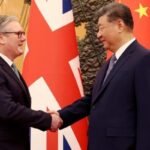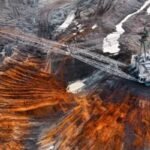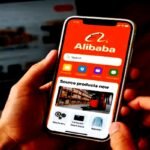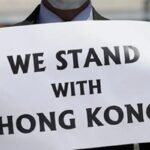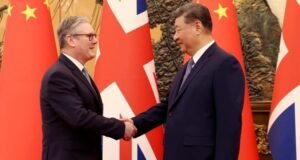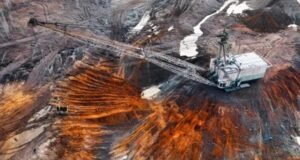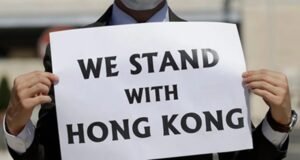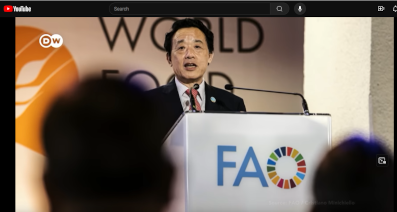
Qu Dongyu, director of the United Nation Food and Agriculture Organization. Screenshot from "China. Power. Food" on YouTube.
Deutsche Welle‘s “China. Power. Food.” investigative documentary connects the dots between the election (and re-election) of China’s Qu Dongyu to the directorship of the United Nations Food and Agriculture Organization (FAO) and the capture of that organization’s resources and mandate to serve China’s national purposes. The FAO, which has an $3.25 billion budget (2022-2023) is responsible for supporting food security globally.
Deutsche Welle, or DW, is a German government funded media outlet that has recently published a number of insightful programs about China issues.See their YouTube page. “We had been playing by different rules.”
“China. Power. Food.” leads off with the story of Qu’s election to the head of the UN FAO in 2019, suggesting that Qu won the directorship through backroom dealmaking rather than persuasively arguing the case for his leadership. At the time, Germany’s representative Julia Klöckner didn’t think Qu was seriously pursuing the position, as in her view, the clearly more qualified French representative ought to have been chosen. Only later did she surmise that “we Europeans only dimly recognized later on that we had been playing by different rules.”
From Klöckner’s comments it sounds like some of the ambassadors may be have been compensated for their favor by receiving first class plane tickets and other travel luxuries during their trip to the conference in Rome. “What great trips had been provided for the ambassadors and their familes,” remarked Klöckner. “And they didn’t fly economy.”
Cameroon dropped out of the race at the same time it was announced that $78 million of loan forgiveness had been granted by China. Cellphones were banned from voting stations after it came out that delegates from African countries were asked to take photos of their ballots at the time of casting their votes.
Monkton thinks that no one should be surprised at this behavior. It is another example of the “wolf warrior” mentality. The Chinese government is not run by people who are concerned about playing by international rules, or decorum. The rules are just means to contrain their idealistic Western opponents. The CCP will take what they want. So why does the CCP want the UN FAO?
Supporting China’s national interests?
The documentary asks why this UN agency warranted such interest from China. Marieke Ohlberg, from the German Marshall Fund, suggests that it was because of China’s history with famine. She presents the narrative in which the Chinese government fed the people, gave them prosperity and therefore earned their support. What she fails to say, or least what DW fails to include, is that Chairman Mao directed the mismanagement of the farming economy, greatly exacerbating hunger in China including by shipping food overseas to get military supplies and to expand his global political power.
Mao gave “gifts” from the Chinese people to less impoverished countries like East Germany. To do meet his production quotas, the Chinese Communists worked and starved whole communities to death, while disrupting both the organization of the farming and the destroying capital, including an insane policy of having local people melt down their capital equipment in backyard steel-making efforts.
Insofar as the Chinese government was able to back off from Maoism after Mao’s death, and made efforts to establish some degree of law-based governance supporting capital formation, along with deciding to make use of the global market, the Chinese per capita wealth has massively grown and starvation eliminated.
Of course, China has historically had an overpopulation problem during its recorded history, leading to repeated famines. In the current context, China deals with its food needs through aggressive exports, as well as heavily-capitalized solutions such as pig farms inside of urban buildings, a kind of pig apartment building, with onsite rearing and rendering. But, the FAO may provide another mechanism for the CCP to have control over food supply. Olhberg describes a project found on the FAO website, dealing with the vaccination of cattle from Laos. The cattle were headed for China, and China paid for the project. But the project was defined as part of the Belt and Road umbrella. And this means that a project that is ostensibly under UN authority is carrying out Chinese state policy. Monkton sees this as an intentional effort to create precedent for funding Belt and Road through the United Nations.
China Scholarship Council
“China. Power. Food.” suggests that one of the ways in which director Qu has furthered his control over the UN FAO is by bringing in staff paid for by China. The jobs are funded by a CCP organization, the China Scholarship Council, that enforces ideological and patriotic compliance. China Scholarship Council fundees have to regularly report to the Chinese embassy. Olberg says that for these staff being responsible to the Chinese government “takes precedence over all other obligations.” Additionally, under Qu, there are many external consultants from Chinese companies, as well as Chinese interns, who are all working around the organizations internal processes, influencing decision-making.
Personnel is policy, so this represents another layer of Chinese control over an “international” body.
Shipping Toxic Chemicals and Building Un-economic Infrastructure
The documentary tells that a whole host of chemicals, such a paraquat and atrazine, that are banned in the EU, have been sent to poor farmers in Africa. The farmers often don’t know the risks of using these toxic substances, or have proper training or equipment. The documentary brings up the data point that Africa has the highest number of pesticide poisonings at 115 million, a 10x magnitude over Europe or South America. This is pared with reporting about the FAO partnering with chemical manufacturers such as Syngenta, which is owned by the Chinese government through its parent Syngenta Group. Such partnerships are organized under an effort known as the Hand-in-Hand initiative.
Max-Otto Baumann of the IDOS Research Institute tells DW that, “Hand-in-Hand is Qu Dongyu’s central initiative… and matchmaking is its most important element.” The FAO under Qu has created an investment portal to connect projects in developing countries with investors. Baumann sees this setup reflecting the Chinese approach to development as a “mutual-benefit calculation”.
DW uses a case study of São Tomé and Príncipe, which sit off the western coast of Africa. It is a very poor place, made poorer by large global companies with commercial fishing vessels out-fishing the local fishermen in hand-hewn wooden rowboats in their traditional fishing area. The FAO proposed building a port for tourism, large enough to accommodate cruise ships. DW interviews some skeptical locals who have been let down by previous big talkers. DW enters into the suspicion that the port may actually be meant to help the Chinese commercial fleet obtain a foothold in the eastern Atlantic.
Is it conclusive?
DW is teasing a conclusion that is not directly proven, that the Qu directorship has put corporate interests, including those of a large Chinese company (Syngenta), ahead of the interest of the very people FAO is supposed to be helping. And Qu’s signature Hand-in-Hand initiative is seen in this light not as an innovative market-inspired solution, but as a convenient way to create more openings for China to grow its economic power and global reach. Such a conclusion is not far fetched given all has been observed about Chinese Communist behavior in the international space. And repeatedly, Belt-and-Road development projects end up with China outright owning the developed resources when the receiving country can’t pay the cost of the infrastructure investment.
To many, the UN FAO is just another of the alphabet soup bureaucracies created by Washington and the international community. But, each organization takeover is another position from which the CCP can operate under cover: We see not the hand of President Xi and the CCP, but the beneficent, if clumsy, hand of the United Nations. These kinds of maneuvers reveal the subtle, long-game thinking by the CCP. The layering of plans and continuous power expansion by China are creeping up on the West, even as the world has become accustomed to China’s everyday military threats and aggressive provocations.
